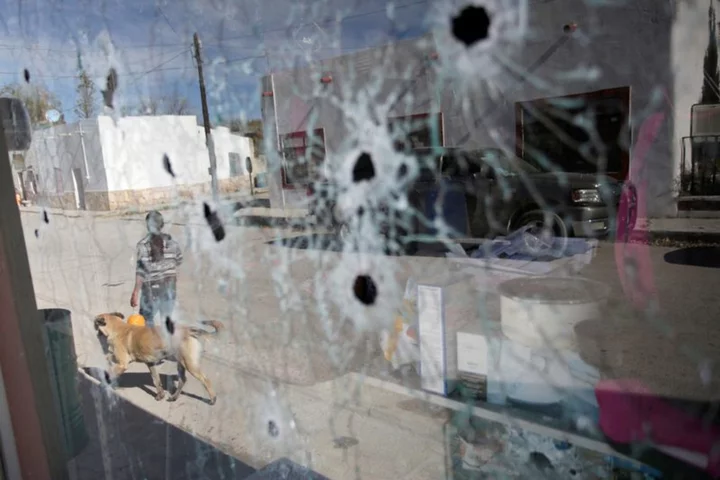By Jonathan Landay, Idrees Ali and Gram Slattery
WASHINGTON Sending troops or firing missiles into Mexico to battle cartels, as proposed by Republican 2024 presidential candidates including former President Donald Trump, could lead to casualties and bloody reprisals on American soil without stemming the flow of illegal drugs, current and former U.S. military and government officials told Reuters.
Trump, Florida Governor Ron DeSantis and former UN Ambassador Nikki Haley are among several Republican candidates who have said they might authorize military force in Mexico - should they win the election - to stem the flood of the cheap and potent synthetic opioid fentanyl into the United States.
Fentanyl seizures at the southern U.S. border have exploded in recent years, rising from just 10.7 kg (24 lb) in 2014 to around 8,400 kg (18,500 lb) in 2022, according to U.S. Customs and Border Protection data.
Almost 80,000 Americans died from opioid-related overdoses in 2022, according to the U.S. Centers for Disease Control, with fentanyl being the primary culprit.
But sending troops into America's top trade partner risks failing for several reasons, the current and former military and State Department officials said.
They argued that cartels could retaliate in U.S. territory and U.S. troops and Mexican civilians could die in firefights with heavily armed cartel members. Mexico would likely cut off cooperation with U.S. law enforcement, while fentanyl labs are hard to locate.
In any case, most fentanyl is smuggled by U.S. citizens.
"You send over a SEAL team. You take out a cartel leader. Okay, now who's in charge? This could create the blowback effect of fracturing the cartels," said a U.S. military officer with experience in Mexico, speaking on condition of anonymity. "We create more and more violent splinter groups that are harder to contain."
The officer said cross-border U.S. raids could ignite gunbattles with cartel gunmen armed with military weapons, including machine guns and rocket launchers.
"This is just a much more sophisticated enforcement problem than I think a lot of people understand," said Earl Anthony Wayne, a former U.S. ambassador to Mexico and fellow at the Woodrow Wilson International Center think tank.
Fentanyl labs are "hard to find," he said. "But it's easy to hit the wrong apartment and kill a bunch of innocents next door, kids, families."
As an example of what could happen, the military officer pointed to January gunbattles in the city of Culiacan between cartel gunmen and Mexican soldiers during the arrest of a son of jailed kingpin Joaquin "El Chapo" Guzman. At least 10 troops and 19 gunmen died.
Jason Blazakis, a former State Department official who worked on counterterrorism and counternarcotics issues, said cartels could respond to U.S. special forces raids by having their operatives attack civilians in the United States. He is running in the 2024 congressional election for a New Jersey-based seat as a Democrat.
In practice, a significant amount of fentanyl is smuggled by Americans via legal border crossings - making the use of deadly force against smugglers politically unpalatable and almost certainly illegal.
A U.S. military spokesman declined to comment on the proposals, saying: "This is a hypothetical, and it is against our policy to speculate about hypotheticals."
IDEA GAINS TRACTION
Trump raised the idea of launching military strikes into Mexico in the final year of his presidency.
According to a memoir by Mark Esper, Trump's second defense secretary, Trump asked at least twice in 2020 if the military could "shoot missiles into Mexico to destroy drug labs."
Esper wrote that he replied that it would be illegal and an act of war.
But Republican strategists say the calls for military action have intensified during the Republican presidential primary campaign as the fentanyl epidemic worsens.
"We're not going to wait. We're not going to let any more Americans die," Haley told Reuters in an interview earlier this month.
"Either (Mexico) does it, or we do it. But one of us is doing it."
In a recent Reuters/Ipsos poll, 52% of respondents supported "sending U.S. military personnel to Mexico to fight against drug cartels," while 26% were opposed. Republicans were supportive by a 64% to 28% margin.
Still, most Americans - including most Republicans - said they would oppose such actions if the Mexican government did not approve, the poll found.
"It's Hollywood. It looks great. We could do it. It would be easy to send them in, a couple of (special forces) teams that could go and extract in extraordinary renditions," said the military officer. "But the question is why? There's no real purpose to it."
The odds of any Republican ordering unilateral military action once in office probably are slim due to the negative collateral effects such an action would have, strategists told Reuters.
"That said, I think if Trump was able to kill a major drug dealer the political benefits would be real," said Alex Conant, an adviser to Republican Senator Marco Rubio's 2016 presidential campaign.
Sergio Alcocer, a former Mexican deputy foreign minister responsible for North America, said such a move would hamper intelligence-sharing on organized crime and immigration and damage economic relations.
"It's unacceptable for Mexico," Alcocer said, "just as it would be on the other side if we were to do it."
(Reporting by Jonathan Landay, Idrees Ali and Gram Slattery; Additional reporting by Dave Graham in Mexico City; Editing by Ross Colvin and Rosalba O'Brien)

